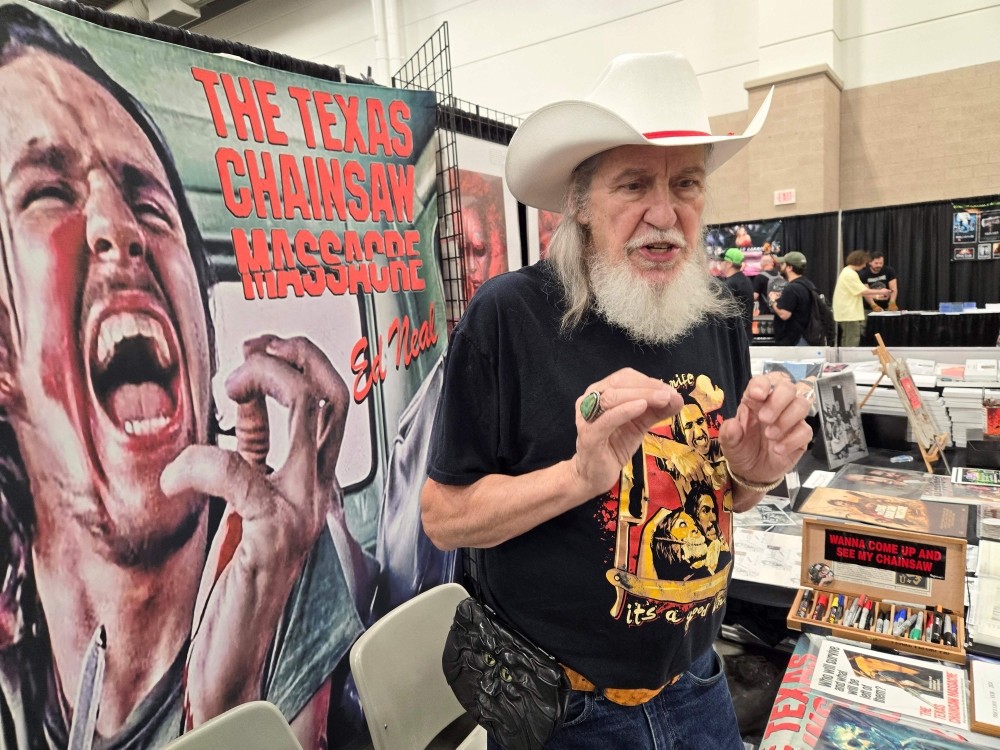IRVING, May 26 — It was shot quickly on a limited budget with unknown actors wearing the same sweat-soaked outfits for weeks on end.
So if The Texas Chainsaw Massacre had disappeared without a trace, not many people would have been surprised.
Instead, it’s celebrating its 50th anniversary this year, a half-century in which it has been the benchmark for a subgenre of horror — the slasher movie.
“There’s no corner of the earth that you can go to and say the Texas Chainsaw Massacre title and not have somebody know what you’re talking about, whether they’ve seen the movie or not,” said Chase Andersen of Exurbia Films, which owns the rights to the franchise.
“It’s become part of the modern nomenclature. It’s as American as apple pie.”
Just not the kind of apple pie that grandma made.
In 1974, director Tobe Hooper hit upon a formula that would inspire countless copycats: a happy-go-lucky group of young people stumble upon an isolated house occupied by a masked lunatic who proceeds to chop them up with sharp things.
Leatherface — the lunatic — wields a chainsaw and a hammer to devastating effect, cutting up one man as he sits in his wheelchair, disemboweling another as a young women watches from the meathook he hung her on, and smashing one guy in the head.
“Michael Myers (Halloween) wears a mask, you know, Jason (Friday the 13th) wears a mask. I mean, Leatherface was the first guy to do it,” said Josh Hazard, who had gathered with other horror fans to mark Texas Frightmare Weekend.
“It really set a precedent for how horror movies were going to go.”
Genre-defining
If it is now obvious that The Texas Chainsaw Massacre was something special, it didn’t appear like that at the time.
Actor Ed Neal, whose early appearance as a wild-eyed hitchhiker presages the violence that is to come, told AFP it hadn’t felt like a genre-defining project.
“They come in and give me the script. And I go: ‘Get the hell out of here with this,’” he said. “I thought, well, nobody will ever see it.
“And here we are.”

Like the recent Netflix word-of-mouth hit Baby Reindeer, The Texas Chainsaw Massacre claims with its opening crawl to have been based on true events.
Some audiences really bought into that, says Neal, who claims some Japanese fans thought it was a documentary.
“They thought it was real footage. ‘How did they get the camera in there? Didn’t they eat the camera guy?’ I said: ‘yeah, they probably did.’”
‘It smelled really bad’
The Massacre franchise has mushroomed in the last five decades, with prequels, sequels, remakes and even video games.
Still, most fans agree, Leatherface’s 1974 outing stands atop the pile.
“To this day, there’s still not another movie like The Texas Chainsaw Massacre,” said Ronnie Hobbs of Gun Interactive, which launched a video game based on the film last year.
“Even the sequels and none of the remakes can capture that grittiness and that uncomfortableness of the original.”
Perhaps some of that is down to the bare-bones production, says Andersen of Exurbia Films.
“Having a shoestring budget... they had to get really creative,” he said. “They didn’t have the luxury of having multiple props or multiple costumes.
“A perfect example would be Gunnar Hansen when he portrayed Leatherface. He had to wear the same costume throughout the entire shoot, and by the end of the shoot, it smelled really bad.”
Teri McMinn, who played one of Leatherface’s victims, said the film’s creative cinematography and its relative lack of actual bloodshed — most of the violence is hinted at, rather than seen — mean she is proud of her part in cinema history.
“This particular one is in the Museum of Modern Art,” she said, referring to the New York institution which is also holding a week-long exhibition on the movie in August.
One bit of camerawork has entered cinematic folklore as true art — a low angle tracking shot that follows her character as she walks up to the house of horrors.
The real terror for McMinn at the time was not the gore, but the prominent place of her backside on the big screen.
“I watched it the first time and I went, ‘oh, my God.’ It was in CinemaScope and Technicolor and I’m just petrified that my mother and my aunt would see it,” she laughed. — AFP






















